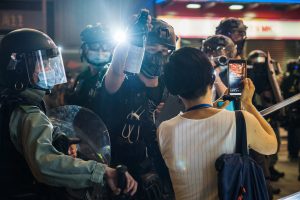Commencing on September 23, based on Police General Orders Chapter 39, police in Hong Kong will not recognize press accreditations provided by local press associations, unless journalists are working for outlets registered with the Government News and Media Information Service (GNMIS) or overseas media outlets that are “internationally recognized and reputable.” The local police force has the right to determine which foreign media outlets are considered to fit those criteria. For the time being, there are 205 news outlets registered with GNMIS.
To some extent, restriction on press recognition in the city is necessary, especially when protesters posing as journalists could hinder police action against violent demonstrators. Also, pseudo-journalists could threaten the personal safety of frontline police officers, as physical clashes between anti-government protesters and police have occurred regularly amid the current socio-political unrest. In that sense, amending the definition of recognized press outlets and journalists can be justified as a means to minimize the number of individuals able to approach police officers whenever police actions are carried out.
That said, however, the amendment will plausibly jeopardize press freedom in Hong Kong. Press coverage by freelancers and independent and student journalists may be significantly limited – even though these individuals can still document police operations and interview protesters in theory, police officers are not obliged to allow them to report. Practically speaking, police officers can, for example, strip unrecognized journalists’ rights to document the overuse of violence by police. Additionally, in theory, if foreign press representatives are covering police operations in Hong Kong, police officers have the right to halt their documentation if said officers identify the press representatives as belonging to media outlets that are not “internationally recognized and reputable.”
In the long run, it’s likely that the new restrictions will mean media representation that is increasingly partial – favoring the pro-Beijing camps – while anti-Beijing or impartial media outlets may be denied the freedom to report freely. Although there are currently more than 200 media outlets registered with GNMIS, the amended regulations on press representation might discourage these outlets from reporting the news objectively, as any impartial or anti-government report published by these outlets could well trigger the police’s termination of their GNMIS membership.
If freedom of the press is lost, any future social injustice happening in the city is unlikely to be covered properly. With access to less partial and less politicized information under threat, the next generation of Hongkongers could end up being badly misinformed.
Jason Hung is a Ph.D. in Sociology candidate at the University of Cambridge and the author of “Social Barriers to, and Gender Gaps in, Educational Attainment Faced by Rural Citizens in China.”

































